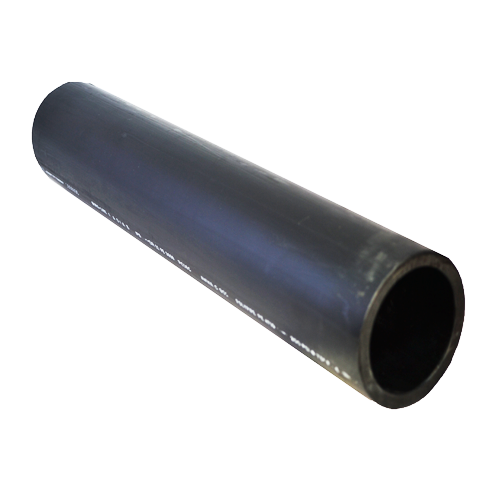Recognizing the Secret Perks of HDPE Pipeline for Water and Wastewater Management
The usage of HDPE pipeline in water and wastewater administration provides various benefits that warrant consideration. Its exceptional durability and lengthy lifespan make it a favored option for lots of jobs. Furthermore, the material's resistance to rust and chemical damage boosts its reliability in various settings. Nevertheless, the benefits extend past simply durability and resistance. Discovering its cost-effectiveness and ecological influence discloses even extra engaging factors for its prevalent fostering in modern-day framework
Outstanding Toughness and Durability

HDPE pipeline sticks out for its remarkable sturdiness and longevity, making it a recommended choice in water management systems. Created from high-density polyethylene, these pipes can stand up to considerable pressure and tension, making certain trusted performance in time. Their durable nature permits them to sustain severe environmental problems, consisting of temperature level fluctuations and soil movements, which can create other materials to stop working.
The life expectancy of HDPE pipes frequently exceeds 50 years, providing an affordable remedy for municipalities and industries alike. In addition, the product's lightweight residential or commercial properties streamline installment, minimizing labor expenses and timeframes. This longevity reduces the need for regular repairs or replacements, better improving its economic charm.
In water management applications, the dependability of HDPE pipes means fewer disturbances and boosted solution connection, making them important to lasting facilities advancement. The mix of sturdiness and durability solidifies HDPE's function as a keystone in efficient water monitoring services.

Resistance to Corrosion and Chemical Damage
While many products succumb to deterioration and chemical damages over time, HDPE pipelines exhibit exceptional resistance, making them excellent for different water management applications. This strength stems from the molecular framework of high-density polyethylene, which is inherently non-reactive and does not rust like steels or break down from exposure to extreme chemicals. Therefore, HDPE is extremely efficient in environments with aggressive materials, such as wastewater systems that might contain acids, bases, and organic solvents.
Furthermore, HDPE pipes can endure environmental aspects such as dirt level of acidity and saline problems, better enhancing their viability for varied applications (custom hdpe pipe manufacturing Midland TX). Their capacity to maintain structural integrity with time decreases the risk of leaks and failures, which is vital in guaranteeing the safety and reliability of water circulation and wastewater monitoring systems. Consequently, the resistance to rust and chemical damage considerably contributes to the overall effectiveness and long life of HDPE piping services
Cost-Effectiveness and Economic Benefits
When thinking about the economic effects of water monitoring systems, the cost-effectiveness of HDPE pipelines ends up being evident. These pipes offer lower installation and maintenance costs contrasted to typical materials like steel or concrete. Their lightweight nature streamlines transportation and installation, leading to lowered labor costs. Additionally, HDPE pipes show a long lifespan, usually surpassing 50 years, which converts to fewer replacements and long-term cost savings.
The resistance of HDPE to corrosion and chemical damage decreases the need for costly repairs and replacements. The pipelines also sustain reliable water circulation, reducing energy costs related to pumping systems. By mitigating leakages and water loss, HDPE pipes add to considerable economic benefits for communities and markets alike. In general, the preliminary investment in HDPE piping can yield substantial financial returns over the lifespan of the water monitoring system, making it a sensible choice for sustainable framework growth.
Environmental Sustainability and Lowered Effect

Versatility and Adaptability in Setup
Due to their distinct properties, HDPE pipelines use amazing versatility and flexibility in setup, making them suitable for a variety of applications. Their light-weight nature permits for much easier handling and transportation, decreasing labor costs and setup time. HDPE pipes can be curved and shaped to fit numerous surfaces and job requirements, which is especially useful in challenging settings.
Furthermore, their resistance to rust and chemical damage permits installation in varied setups without the demand for specialized safety coatings. The capacity to fuse joints develops a continual, leak-free system, enhancing the general honesty and reliability of the installation. HDPE's flexibility additionally accommodates ground motion, reducing the risk of damages in locations susceptible to shifting soil. In general, these characteristics make HDPE pipes not only flexible yet likewise a recommended choice for water and wastewater administration systems.
Frequently Asked Concerns
Exactly How Does HDPE Pipeline Contrast to PVC in Water Administration Applications?
HDPE pipe provides premium flexibility, resistance to corrosion, and resilience compared to PVC. Its lighter weight promotes much easier setup, while its lengthy life-span lowers replacement prices, making HDPE a recommended selection in water management applications.
What Is the Lifespan of HDPE Water Lines Under Normal Conditions?
Under regular conditions, HDPE pipes can have a lifespan varying from 50 to 100 years. Their longevity and resistance to rust contribute to their lasting performance in various applications, making them a stretch hose pipe reliable selection for facilities.
Are HDPE Water Lines Recyclable After Their Life Span?
Yes, HDPE pipes are recyclable after their life span. Pipe Manufacturing Midland TX. They can be processed and repurposed into brand-new products, substantially minimizing environmental effect and advertising sustainability within the industry, making them a green selection for piping options
What Is the Installment Refine for HDPE Piping?
The setup process for HDPE pipelines includes site preparation, trenching, pipeline fusion or mechanical signing up with, backfilling, and stress screening. Appropriate strategies guarantee a long lasting and effective system for moving water and wastewater effectively.
Can HDPE Pipeline Be Used for Both Safe And Clean and Non-Potable Water Systems?
Yes, HDPE pipes can be utilized for both drinkable and non-potable water supply. Their flexibility, resilience, and resistance to corrosion make them ideal for numerous applications, making certain safe and efficient transportation of water in various contexts.